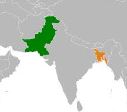| Mon. July 14, 2025 | |

|
|
|
“The piece refutes claims that Pakistan's ISI is behind the unrest in Bangladesh. It emphasizes the need for Bangladesh to reclaim its political unity and social viability, while maintaining balanced relations with neighbors. It also asserts Pakistan's support for Bangladesh's progress.” The recent student-led protests that culminated in the ousting of Awami League's Hasina Wajid have garnered significant international attention, highlighting the Bangladeshi people's unwavering resolve against years-long authoritarian regime. As Hasina sought refuge in India- her government’s key ally- her son, Sajeeb Wazed Joy, has made statements that seem more damaging than beneficial to both his party and his mother. His allegations of foreign interference, particularly blaming Pakistan's Inter-Services Intelligence (ISI), deserve critical scrutiny. Such claims must be examined within the broader context of Bangladesh's internal politics and its complex relationship with India. Historical Context and Political Diversion The Awami League, under Sheikh Hasina’s leadership, has maintained a tight grip on power in Bangladesh for over a decade. During this time, the party has often resorted to diversionary tactics, including efforts to externalize the blame for maintaining the political capital. This has been a longstanding practice, especially during spells of domestic strife. By attributing unrest to external actors like Pakistan, the Awami League distracts public from the pressing issues such as governance failures, human right abuses and partly some economic challenges. This tactic serves multiple purposes: it unifies the populace against a common enemy, consolidates power by rallying nationalist sentiments, and deflects criticism of the Government’s own actions. Such narratives have historically allowed the Awami League to justify crackdowns on dissent and to portray opposition parties, particularly the Bangladesh Nationalist Party (BNP) and Jamaat-e-Islami, as agents of chaos rather than legitimate political actors. The Role of Disinformation Disinformation, being floated on social media to stoke anti-Pakistan sentiments, while blaming its intelligence agency for chaos in Bangladesh, is actually nothing but a coordinated effort. Suvrokamal Dutta’s assertion that “the unrest is a product of Pakistan’s orchestration”, overlooks the broader socio-political context. It disregards the genuine grievances of the Bangladeshi people, who are increasingly disillusioned with Hasina regime's failure to address their needs. By labeling dissent as foreign interference, ex Government actually undermined the legitimate aspirations of Bangladeshi citizens for democracy and justice. The Quest for Sovereignty Bangladesh's sovereignty is a critical issue that has often been compromised under the guise of regional security partnerships, particularly with India. The allegations against Pakistan, while serving the former ruling party’s narrative, ignore the fundamental right of the Bangladeshi people to self-determination and governance free from external influence. Bangladeshis have historically expressed their desire for a balanced foreign policy that prioritizes their nation’s interests over the geo-political ambitions of larger powers. The narrative that positions Pakistan as the antagonist, distracts from the pressing need for Bangladesh to reclaim their freedom of expression and foster an independent foreign policy that is not solely dictated by India or any other nation. Pakistan’s Stance: A Call for Cooperation It is essential to note that Pakistan has consistently extended a hand of friendship to Bangladesh, despite the historical grievances stemming from the Liberation War of 1971. The new political landscape in Bangladesh, therefore presents an opportunity for re-evaluation and reconciliation. Pakistan does not seek to undermine Bangladesh’s progress or stability. On the contrary, it wishes to engage in bilateral relations that prioritize mutual respect and cooperation. False narratives being spun by Awami League and its allies, do not represent the realities of Pakistan's intentions; instead, those are means of deflecting criticism from the Bangladeshi Government. As the Bangladeshi people begin to recognize the fallacies caused due to diversionary tactics, it becomes imperative that they remain steadfast in pursuit of democracy, development, and dignity. The future of Bangladesh should be shaped by its citizens, free from the shackles of manipulation by those in power who prefer to blame external forces rather than confront their shortcomings. Pakistan has categorically stated that it steadfastly stands with the people of Bangladesh. The Importance of a Unified Bangladesh For Bangladesh to move forward, it remains crucial to foster unity among its diverse political factions, including the Awami League and the BNP. The emphasis should be on creating a level playing field, where all voices are heard and respected. Such inclusivity will not only strengthen the democratic fabric of the nation but also shield it from the divisive tactics employed by external forces, including disinformation campaigns. It is a given fact that restoration of democracy remains essential for Bangladesh’s future. However, this must occur without the backdrop of fear-mongering and the scapegoating foreign entities. The Bangladeshi people are resilient and capable of charting their own path, one that prioritizes national interests over those of any external power. A Future of Cooperation In conclusion, while the unrest in Bangladesh is real and concerning, the narrative which positions Pakistan as the orchestrator of chaos, is a concocted, frivolous and smear vilification campaign paddled by India against Pakistan. The Awami League’s attempts to shift blame serve only to obscure the underlying issues that require urgent attention. Pakistan’s stance remains one of support and goodwill towards the people of Bangladesh. In this era of evolving political dynamics, it is crucial to foster a relationship built on mutual respect and understanding, rather than one marred by historical grievances and unfounded accusations. The future of Bangladesh should be determined by its people, and any attempt to divert from this path will only serve to delay the progress they rightfully seek. Manahil Jaffer is an International Relations scholar. She can be reached at manahil.jaffer786@gmail.com.
|
|
| Contact Us | About Us | Donate | Terms & Conditions |
|
All Rights Reserved. Copyright 2002 - 2025

